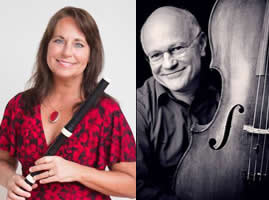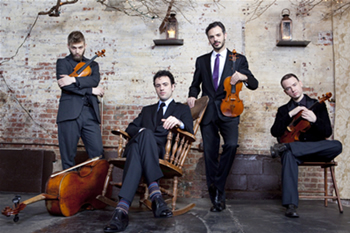 Eastern Music Festival‘s associate principal cellist Julian Schwarz welcomed listeners to the final virtual chamber music concert of the 2020 season. He expressed how proud and how much he is “in awe of the amazing contributions, the virtuosity of our esteemed faculty members and their willingness to provide recordings throughout the summer to share with our students and patrons, even though it’s nothing like sharing this energy in person at Guilford College.” He also stated that this concert is perhaps the most varied of any of them. Hard to argue with that, given the range of offerings presented within the 50-minute program!
Eastern Music Festival‘s associate principal cellist Julian Schwarz welcomed listeners to the final virtual chamber music concert of the 2020 season. He expressed how proud and how much he is “in awe of the amazing contributions, the virtuosity of our esteemed faculty members and their willingness to provide recordings throughout the summer to share with our students and patrons, even though it’s nothing like sharing this energy in person at Guilford College.” He also stated that this concert is perhaps the most varied of any of them. Hard to argue with that, given the range of offerings presented within the 50-minute program!
The evening began with the short but rhythmically vital “Danza Brasilera” by Jorge Morel (Argentina, b.1931). Dance rhythms were ever present as guitarist Jason Vieaux displayed wonderful facility on the instrument. The entire performance was first-rate: cleanly played with impeccable musicianship. It was recorded at Vieaux’s home in Cleveland, OH, in June 2020 for the Cleveland Institute of Music graduation celebration.
“Lily Lake Road” by Kevin Fox (Canada, b.1968) followed. This was a wonderful 8-minute multi-sectioned excursion through slowly unfolding melodies and colors provided by the unusual combination of steel drum (John Shaw) and harp (Anna Kate Mackle). Sometimes the steel drum provided harmonic underpinning for the harp melody; sometimes the roles were reversed. Add some lovely unisons, and the result was a mesmerizing, ethereal experience. Both Mackle and Shaw (wife and husband team) displayed utmost sensitivity to changes in texture and dynamics, and the ensemble was terrific. The piece was recorded in their home in St. Petersburg, FL, in July 2020.
“Syrinx” (1913) by Claude Debussy (France, 1862-1918) has become a staple of the literature and played an important role in expansion of solo flute music in the 20th century. It also allows for “generous room for interpretation and emotion,” of which EMF principal flutist Les Roettges took full advantage. Long, sinuous, and luxuriously expressive lines flowed unerringly from his flute, recorded from his home in Ponte Vedra Beach, FL, in June 2020.
Transcriptions of two piano pieces by Debussy followed, played my EMF violinist Courtney LeBauer and pianist Michelle Post. The recordings were from a performance in December, 2019, at Converse College, where LeBauer is on the faculty. Both transcriptions basically gave the melody to the violin leaving accompaniment to the piano. “La plus que lente” (1910) is a slow “waltz,” with much room for flexible tempos. Both LeBauer and Post used that flexibility to explore expressive nuances in the score. Up next was “Minstrels” from Book I from the composer’s Préludes. This is a fun piece, a lampoon on the music heard in contemporary music halls in Paris. Spikey rhythms and unexpected twists and turns did nothing to derail the duo’s excellent ensemble. Spirited playing and good intonation made these two pieces crowd-pleasers.
Violinist Randall Weiss took the listeners back two centuries for the Allemande movement Partita No. 1 in B minor for Violin Solo, S.1002, by J.S. Bach (Germany, 1685-1750). The performance was recorded in his home in San Francisco, CA, in July 2020.
Bach’s works for the solo violin are like the Bible to most violinists. They are incredibly rich, and extremely difficult to play, as the soloist must play both the melody and the accompaniment on the four strings. Double, triple, even quadruple stops abound in the score. Weiss negotiated these challenges with aplomb, turning in a committed, convincing reading.
The Duo for Violin and Cello by Gideon Klein (Czech, 1919-45) was recorded by Cathy (violin) and Neal Cary (cello) in their home in Richmond, VA, in July 2020. The work was unfinished when the composer was deported in 1941 to the Terezin concentration camp, where he was the organizer of cultural life. Understandably, the work teems with anguish and pain and places uncompromising demands on performer and listener alike.
The opening Allegro con fuoco features some unison playing as well as lots of “melody and accompaniment.” Much of the character of the movement is nervous and outspoken. The cello sometimes plays “am Steg” (on the bridge), creating an unearthly tone color, and tremolos and pizzicatos are frequent.
The Lento begins with a singing melody in the violin, with plucked chords in the cello, but strident clashes soon arrive. The piece stops abruptly, of course, as it was unfinished. It would be hard to imagine a more committed performance. Ensemble between the two was impeccable, and the emotional depth and intensity was ever present.
Another piece for solo violin, the third movement “Upsurge” from Inscriptions (1991) by Shulamit Ran (Israel, b.1949) was up next. Ran is only the second woman composer to be awarded a Pulitzer Prize (1990), the first being Ellen Taaffe Zwilich, in 1983. The 5-minute movement begins with harmonics in the extreme upper register of the violin. Agitated passages, sudden stops, silence, a good amount of dissonance and some lyric lines help create a dramatic and profound statement. Ioana Galu, who was recorded in Bowling Green State University’s Bryan Recital Hall, OH, November 2012, turned in an impressive performance, negotiating the fiendish score with authority and finesse.
Judith Saxton (trumpet and coronet) contributed two short movements of her original composition Crazy Creative – Earth Day 50th Anniversary to the evening’s recital. Recorded on her back porch in Winston-Salem, NC, in April 2020, “Dragonfly Duet” proved to be a somewhat bluesy one-minute trumpet treat with a hint of a tango rhythm. To this listener, “Lilac Loveliness” (played on coronet) was a bit reminiscent of tunes from early 20th century. Saxon’s solid playing and long-breathed lines were both impressive and fun to hear.
The evening concluded with Waldesruhe, Op. 68, No. 5 (Silent Woods), by Antonin Dvořák (Czech, 1841-1904). The recording, made in Reston VA, in June 2020, featured wife-husband team Marika Bournaki (piano) and Schwarz (cello). The work is evocative, poignant, and deeply emotional; it was tenderly and beautifully played, providing a lovely end to this very strange COVID-19 59th season of the Eastern Music Festival.












